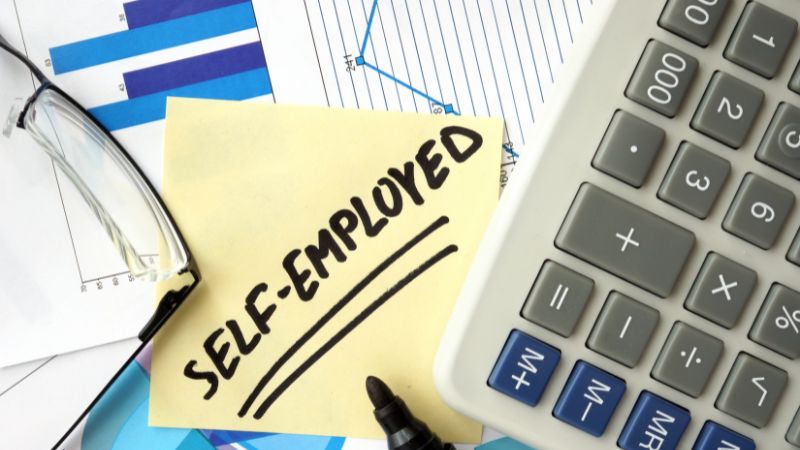Categories
The Ultimate Guide to Self Employed Loans

One of the problems that raises its head once you make the move to becoming self employed is the difficulty in getting financing.
Whether you are looking for loans to help you grow your business, personal credit to help keep everything ticking over in your home life, or significant financing such as a mortgage, there is the worry that getting a self employed loan is impossible.
Are there financial products tailored for being self employed? Can you get a self employed loan?
Happily, the answer is yes, you can. Let’s not beat around the bush; there can be issues getting a loan when you’re self employed, but when you understand what it is lenders are looking for, it’s easy to make sure you meet the criteria.
Let us explain the process.
Table of Contents
What Does Self Employed Mean for Loan Applications?
Risk Assessment and How it Affects Self Employed Loans
Types of Loans for the Self Employed
Business Loans vs. Personal Loans When Self Employed
Mortgages for Self Employed People
Applying for a Loan When Self Employed
Self Employed and Bad Credit - The Options
What Does Self Employed Mean for Loan Applications?
First of all, it's important to understand what we mean by ‘self employed’. For the purposes of a loan, it really means ‘sole trader’ or those who are in a partnership. While technically, if you are the director of a limited company, you are self employed (as in you own the business that employs you), from a finance perspective you are an employee of that business and no, you’re not self employed.
Consequently, when you’re looking to get a loan when you’re self employed, there can be a blurring between what counts as a business loan and what counts as a personal one.
Similarly, checks done on the business are checks done on the person. There’s no separation of liability and so there’s no separation of finances.
Risk Assessment and How it Affects Self Employed Loans
Loans are all about risk assessment. Whenever a bank or any other lender considers you for a loan, what they are really interested in is how much of a risk lending you the money would be, and how likely are they to get it paid back (along with the interest).
The Sliding Scale of Risk
Risk is not black and white; in fact it's a sliding scale that can change every month.
At the top end of the scale, the extremely risky are unlikely to get a loan at all. After all, who lends money to someone who is sure to never pay it back?
Below that come the very risky propositions. Most banks aren’t interested here, but there are some specialist lenders who are happy to take that risk. They will want to make more profit off their gamble though (and it is a kind of gamble), so expect higher rates of interest and potentially additional fees.
Next are the moderately risky types. Again, interest rates will be higher, but there’ll be more products on the market and competition between finance providers will mean there are some good deals to be had. Perhaps they’ll ask for some sort of guarantee, such as asset-based collateral or a secondary signatory as guarantor.
And if you’re not really a risk at all with a proven credit record? Well, everyone will give you a loan and you’ll be able to pick from different terms to get a good deal.
Self Employed People and Risk
Self employed people are inherently more of a risk than those in PAYE-style employment. Why? Because if something goes wrong with your venture, then you’re out of work and probably broke as well, having thrown everything you can at your business idea.
Equally, they’ve been burned a good few times lending money to enthusiastic self employed entrepreneurs who have crashed six months in.
One of the key things that gives lenders a sense of security with self employed loan applications is to see multiple years of trading history. If you’ve been doing your job solidly for a few years, you’re a lot less risky than the person who started their venture a week earlier. That’s why many loans will ask for one, two, or three years of accounts.

Personal and Business Credit Ratings
The most efficient metric used to measure your risk is your credit rating.
There are actually two of these for many business people - a personal credit rating and a business credit rating that’s tied directly to the company.
In the UK there are three main credit reference agencies - Equifax, Experian and TransUnion. Each has their own score and different banks and lenders each have a preferred agency to use. However, those scores are going to be very similar and it rarely makes a difference which credit reference agency you are checked against.
Nonetheless, if your loan chances are very tight, it may be worth looking into which agency your chosen lender uses and checking their report above the others.
When you do things that show you are low risk, such as paying your credit card bill, avoiding maxing out your credit, and making mortgage payments on time, your credit rating improves.
When you are financially irresponsible (missing bill payments, stretching your credit cards as soon as the money becomes available, etc.) then your credit rating drops.
Risk and Documentation
Another factor that goes a long way to mitigating risk is documentation.
Banks will not believe you just because you say something - they want to see it on paper (or on-screen). Technological advancements in the banking sector over the last decade mean there is much that can be easily accessed (with your permission), so identity checks, credit checks, and banking records can be quickly handed over to your lender for their use.
If you are unable or unhappy to share documented evidence of your personal and financial activity, and cause the lender concern in this way, you will present as a much greater risk.
Risk Assessment Summary
In short - being self employed makes you a greater risk, but it doesn’t mean there’s nothing you can do about it. Taking care of your credit rating, having documentation ready, and being patient to add a few months to the length of time you have been in business can make a huge difference to your risk assessment.
Types of Loans for the Self Employed
Being self employed actually makes no difference on the range of personal loans and other personal finance products that are available. Consider the following that can all be applied for:
- Unsecured loans (loans that require no additional guarantee)
- Secured loans (loans tied to an asset as collateral)
- Personally guaranteed loans (loans where a third-party agrees to act as a guarantor)
- Credit cards (lines of credit provided by a third-party lender)
- Overdrafts (lines of credit provided by your bank as an extension of your bank account)
- Mortgages (secured loans to purchase property)
- Vehicle finance (spreading the cost of vehicle ownership)
- Other asset finance (payment terms for equipment, machinery, etc.)
While being self employed doesn’t change the loans you can apply for, your risk assessment may be higher and you could suffer larger interest rates than a comparable salaried employee.
Business Loans vs. Personal Loans When Self Employed
As discussed earlier, from a finance provider perspective, self employed people are considered individuals who are eligible for personal finance products and are not typically classed as a business in that way.
This can mean that specialised business loan products are more difficult to obtain for the self employed entrepreneur. Some examples include:
- Invoice finance (specialist business-to-business short term finance)
- Merchant cash advance (short term finance based on credit and debit card transactions)
- Commercial mortgages (asset-based loans to purchase office buildings and industrial space, or expanding a portfolio of buy-to-let property)
- Fleet financing (asset finance for multiple vehicles)
- Purchase order finance (finance to facilitate supply chain payments)
- Trade finance (a range of large-scale products designed to aid with international trading)
Expanding your business from being a single person venture to a larger company with more formal accounting can help you in many ways, one of which is providing access to significant funding.
One factor that is both an advantage and a disadvantage is that if you make the leap from sole trader to limited company, the new enterprise will be considered an entirely new company.
While this does mean an effective reset on your years of accounting, putting you back at ground zero when it comes to many risk assessment processes, it also gives you access to a wide range of startup capital and government grants that can propel your business forward.
It is also worth noting that many personal loans are structured in a way that means they are not to be used for business purposes.
For example, many remortgages are restricted such that they will not be provided to fund a limited company startup. Make sure you check the terms of any loan if you are looking to use them in this way.
Mortgages for Self Employed People
Probably the largest single financial undertaking for most self employed people will be to take out a self employed mortgage.
Here, risk assessment plays a substantial part of the process and it is the larger riskiness of the sole trader that leads to the perception that a mortgage when you are self employed is difficult or even impossible to obtain.
The truth is, if you mitigate that risk for the lender, you will find that getting a mortgage is not as hard as it may seem.
Things to consider include:
- Your credit report - A key factor is going to be your personal credit score. If there have been any hiccoughs in repayments in recent months then your chance of a mortgage drops significantly. Serious defaults and CCJs will impact your credit report for longer. Patience is key here, and it can be worth putting off any application until you have had three to six months of perfect credit history.
- Your income - It sounds obvious, but your income is a major factor. If your self employed business is only just scraping by then the mortgages you will be able to access will be low. If you know your business is on the up, it may be worth waiting for the next financial year to show the improved accounts. That said, many specialist self employed mortgage lenders are willing to look at the current growth of your business, even in the shorter term, and will be able to adjust their assessment positively if there is clearly an upward trend in business activity and profit.
- Your deposit - The larger the deposit you have to put into the house, the lower the risk for the lender - it’s that simple. Saving up at least 10% of your property value is sensible if you are looking to obtain a mortgage as a self employed person. Make sure your deposit is money you have saved up and don’t lean on another loan to provide the deposit, even one from family.
- The length of time you have been in business - Having two to three years of accounts that show a stable income will go a long way to increasing your mortgage size and the likelihood of a successful application - but, can be possible with just one year's accounts.
- The type of property - Some self employed people try to immediately stretch to a dream of an unusual property, such as fixing up a run down old farmstead in the rural countryside. This only increases the difficulty of a successful mortgage application and can complicate things further.
- Your debt service - Debt service is an analysis of your monthly debt repayment liabilities and has a major effect on your mortgage. Mortgage stress tests focus on this factor and if you are stretched in other ways (credit cards, overdrafts, vehicle finance etc.) then it will greatly diminish your chance of a successful mortgage. Reducing this prior to making an application will be of considerable help.
- Your industry - Some industries are inherently more risky than others. While there is little chance that you can change your industry, it is something you should take into consideration.
- Dependants - Having a family who you need to provide for is a drain on your resources and increases your risk. If you have multiple children or other dependants, you may need to improve your financial lot to show they are easily catered for.
- Financial support - Applying for a joint mortgage with your partner can help, especially if they are an established salaried employee with another company or otherwise financially stable.
- The mortgage provider - Some mortgage providers are more flexible than others, and still some specialise in the self employed arena. It is worth approaching a niche mortgage lender with the experience to understand your situation and accounting, as well as those who have expertise in your industry sector. While high street banks are a staple for PAYE-based salaried workers, they often struggle to offer competitive and valuable self employed mortgages due to their stricter application criteria.
- Specialist help - The truth is, that if you know what you’re doing, it’s a lot easier to get a self employed mortgage. Working with a professional financial broker and mortgage specialist will greatly increase your chance of getting a mortgage while self employed. At Clifton Private Finance, we have a hugely experienced expert team of mortgage advisors with access to the whole UK marketplace of specialist lenders.
Applying for a Loan When Self Employed
Applying for self employed loans is most successful when you are prepared. Make sure you know your financial situation thoroughly (don’t stick your head in the sand and hope!) and have the documentation you need ready.
You should:
- Access your credit report online and go through it thoroughly. If there are any ways you can improve it for the following month and you can wait, put in a concerted effort to make those improvements before applying.
- Build a clear spreadsheet of your income and outgoings to neatly present to lenders.
- Obtain copies (physical or digital) of any supporting documentation so it is ready should it be requested. This includes identity documents (driving licence or passport), proof of address, tax returns, bank statements, plus your business and personal accounts.
- Compare loans. They will vary greatly and it’s important that you not only check the ones that have the best interest rates, but look deeper into the terms and conditions of the loan.
Self Employed and Bad Credit - The Options
One problem that comes up time and time again is the mixture of being self employed and also having a poor credit report.
Happily though, the answer is yes. There are plenty of specialist lenders willing to look at extremely high risk cases like this, but you should expect to be offered smaller sums at higher interest rates.
One advantage of a bad credit loan is that it offers a fantastic opportunity to rebuild your credit rating. If you take out a loan, even one with unfavourable terms, and then prioritise its repayments each month, you will demonstrate good financial management and your credit score will grow.
Of course, the inverse is also true, and if you stretch with a bad credit loan that you struggle to repay, you will further damage your credit score and make future funding even more difficult to obtain.
Some options for self employed loans when you have bad credit include asset-based loans, where you offer a tangible asset (such as a car or property) as collateral for the loan; or to obtain an additional signatory as a guarantor for your loan. Bear in mind that both move some of the risk from the lender to you; if you fail to make repayments you may lose your asset or force your guarantor to make good on the loan.














